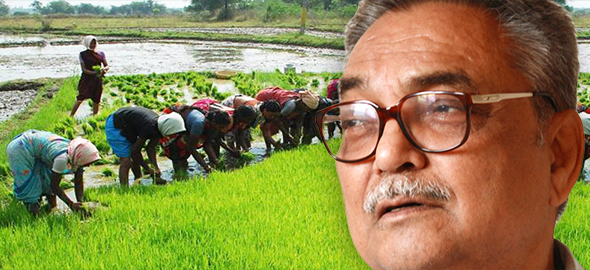Sharad Joshi: An Economist Who Worked for India’s Farmers

Exiting 2015, India lost one of her free market champions, Sharad Anantarao Joshi. At a time when farmer suicides are becoming rampant across the nation, someone like Joshi, with his ideas for agriculture, will be sorely missed. Many have called Sharad Joshi a man who was way ahead of his time. He first came into the Indian limelight in 1980, when he led an agitation in Nashik district, Maharashtra, in support of onion farmers. Joshi was an economic liberal, whose ideas came at an opportune time, when the country’s Green Revolution has started to show that farmers were getting diminishing returns, and hence were becoming increasingly discontent.
Sharad Joshi, The Early Years
Born on September 3, 1935, in Satara, Maharashtra, Joshi went on to complete a Master’s degree in Commerce from Sydenham College, Mumbai, in 1957. On completing his education, he became at Lecturer in Economics and Statistics at the University of Poona, although this stint lasted only a year, till 1958. He then spent a decade working for the Indian Postal Service, following which he worked for the Chief Informatics Service of the International Bureau of the UPU in Bern, Switzerland until 1977.
The Farmer’s Champion
Having worked as an economist for United Nations, Sharad Joshi left this plush job to found the Shetakara Sanghatana in 1979, focus specifically on the cause of Indian farmers. This non-political organisation aimed at ensuring that farmers in the nation obtained “freedom of access to markets and to technology.”
Joshi worked tirelessly to bring to the forefront the plight of India’s farmers. For instance, he championed the cause of prices that farmers were paid for their produce. He believed that farmers were victims of “negative subsidy,” meaning that the price they were paid within the restricted domestic market was significantly lower than the global price, which in turn was bloated due to the extravagant subsidies offered by the developed economies.
Joshi believed that the solution lay in free markets. A prominent example of his struggle was his agitation for cotton growers, which he started in November 2001. He led a long march to Mumbai, from Sevagram in December 2001, covering a distance of over 700 km. When the agitation reached the corridors of power of the central government in Delhi, he finally succeeded in getting the Parliament’s approval for Bt cotton being used for commercial purposes.
He continued his work against the artificially repressed crop prices in the nation, due to restrictions in free movement, storage or processing, both domestically and for exports.
Economic Ideology
Sharad Joshi was a vociferous proponent of globlisation and liberalization. He welcomed foreign investment in the belief that this would give access to the latest agricultural technologies, while helping to build capacity and expanding the Indian peasant’s reach to buyers.
Joshi also advocated SEZs for organic farming, medicinal and aromatic plants, horticulture and the manufacture of hybrid seeds. He proposed the establishment of certifying agencies for organic produce, while advocating the creation of zones for growing different varieties of onions to avoid the possibility of shortage.
This agrarian economist passed away on December 12, 2015, after a prolonged illness. He will be most sorely missed by rural India, given that he had dedicated his life to uplifting the socio-economic environment for the Indian peasant.
 Rakesh Wadhwa. Ever since, I was a school boy, I knew India was on the wrong path. Socialism was just not what we needed to get ahead. Government controlled our travel; government controlled our ability to buy and sell; and government controlled our freedom to move our money. My life has focused on the inherent rights people have. When I was in college, I never understood, what the governments meant by their "socialistic attitude". If people are free to buy, sell and move their capital themselves without any restrictions by state, then the welfare of people is inevitable & hence the countries they live in will become wealthy. The government has no right whatsoever, to point a finger at me or my business. I am not a revolutionary. I just want to light up my cigarette and not get nagged about it. I believe in non-interfering attitude to attain more.
Rakesh Wadhwa. Ever since, I was a school boy, I knew India was on the wrong path. Socialism was just not what we needed to get ahead. Government controlled our travel; government controlled our ability to buy and sell; and government controlled our freedom to move our money. My life has focused on the inherent rights people have. When I was in college, I never understood, what the governments meant by their "socialistic attitude". If people are free to buy, sell and move their capital themselves without any restrictions by state, then the welfare of people is inevitable & hence the countries they live in will become wealthy. The government has no right whatsoever, to point a finger at me or my business. I am not a revolutionary. I just want to light up my cigarette and not get nagged about it. I believe in non-interfering attitude to attain more. 
 The Bastiat Award is a journalism award, given annually by the International Policy Network, London. Bastiat Prize entries are judged on intellectual content, the persuasiveness of the language used and the type of publication in which they appear. Rakesh Wadhwa won the 3rd prize (a cash award of $1,000 and a candlestick), in 2006.
The Bastiat Award is a journalism award, given annually by the International Policy Network, London. Bastiat Prize entries are judged on intellectual content, the persuasiveness of the language used and the type of publication in which they appear. Rakesh Wadhwa won the 3rd prize (a cash award of $1,000 and a candlestick), in 2006.
What the readers are saying…